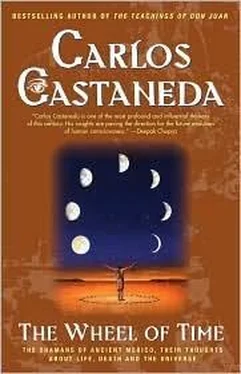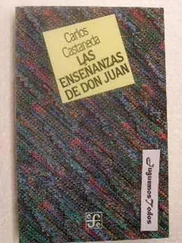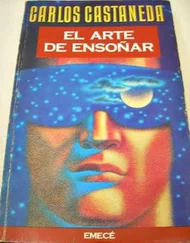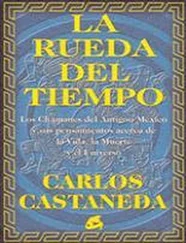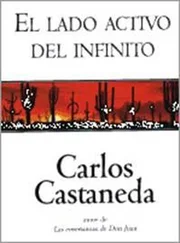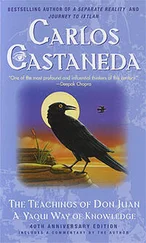He was absolutely right. All my fears were triggered by some banality, of which I was ashamed at the time, and am ashamed of now. I was afraid of demoniacal possession. Such a fear had been encrusted in me very early in life. Anything that was inexplicable was naturally, something evil, something malignant that aimed at destroying me.
The more poignant don Juan's explanations of the world of the ancient shamans became, the greater my sensation of needing to protect myself. This sensation was not something that could be verbalized. It was, rather than the need to protect the self, the need to protect the veracity and the undeniable value of the world in which we human beings live. To me, my world was the only recognizable world. If it was threatened, there was an immediate reaction on my part, a reaction that manifested itself in some quality of fear that I will be forever at a loss to explain; this fear was something one must feel in order to grasp its immensity. It was not the fear of dying or of being hurt. It was, rather, something immeasurably deeper than that. It was so deep that any shaman practitioner would be at a loss trying even to conceptualize it.
"You have come, in a roundabout way, to stand directly in front of the warrior," don Juan said.
At that time, he emphasized to no end the concept of the warrior. He said that the warrior was of course, much more than a mere concept. It was a way of life, and that way of life was the only deterrent to fear, and the only channel which a practitioner could use to let the flow of his activity move on freely. Without the concept of the warrior, the stumbling blocks on the path of knowledge were impossible to overcome.
Don Juan defined the warrior as the fighter par excellence. It was a mood facilitated by the intent of the shamans of antiquity; a mood into which any man could enter.
The intent of those shamans," don Juan said, "was so keen, so powerful, that it would solidify the structure of the warrior in anyone who tapped it, even though they might not be aware of it."
In short, the warrior was, for the shamans of ancient Mexico, a unit of combat so tuned to the fight around him, so extraordinarily alert that in his purest form, he needed nothing superfluous to survive. There was no necessity to make gifts to a warrior, or to prop him up with talk or actions, or to try to give him solace and Incentive. All of those things were included in the structure of the warrior itself. Since that structure was determined by the intent of the shamans of ancient Mexico, they made sure that anything foreseeable would be included. The end result was a fighter who fought alone and drew from his own silent convictions all the impulse he needed to forge ahead, without complaints, without the necessity to be praised.
Personally, I found the concept of the warrior fascinating, and at the same time, one of the most frightening things I had ever encountered. I thought it was a concept that, if I adopted it, would bind me into servitude, and wouldn't give me the time or the disposition to protest or examine or complain. Complaining had been my lifelong habit, and truthfully, I would have fought tooth and nail not to give it up. I thought that complaining was the sign of a sensitive, courageous, forthright man who has no qualms in stating his facts, his likes and dislikes. If all of that was going to turn into a fighting organism, I stood to lose more than I could afford.
These were my inner thoughts. And yet, I coveted the direction, the peace, the efficiency of the warrior. One of the great aids that the shamans of ancient Mexico employed in establishing the concept of the warrior was the idea of taking our death as a companion, a witness to our acts. Don Juan said that once that premise is accepted, in whatever mild form, a bridge is formed which extends across the gap between our world of daily affairs, and something that is in front of us, but has no name; something that is lost in a fog, and doesn't seem to exist; something so terribly unclear that it cannot be used as a point of reference, and yet, it is there, undeniably present.
Don Juan claimed that the only being on earth capable of crossing over that bridge was the warrior: silent in his struggle, undetainable because he has nothing to lose, functional and efficacious because he has everything to gain.
QUOTATIONS FROM JOURNEY TO IXTLAN
We hardly ever realize that we can cut anything out of our lives, anytime, in the blink of an eye.
One shouldn't worry about taking pictures or making tape recordings. Those are superfluities of sedate lives. One should worry about the spirit, which is always receding.
Personal history must be constantly renewed by telling parents, relatives, and friends everything one does. On the other hand, for the warrior who has no personal history, no explanations are needed; nobody is angry or disillusioned with his acts. And above all, no one pins him down with their thoughts and their expectations.
When nothing is for sure we remain alert, perennially on our toes. It is more exciting not to know which bush the rabbit is hiding behind than to behave as though we knew everything.
As long as a man feels that he is the most important thing in the world, he cannot really appreciate the world around him. He is like a horse with blinders; all he sees is himself, apart from everything else. Death is our eternal companion. It is always to our left, an arm's length behind us. Death is the only wise adviser that a warrior has. Whenever he feels that everything is going wrong and he's about to be annihilated, he can turn to his death and ask if that is so. His death will tell him that he is wrong, that nothing really matters outside its touch. His death will tell him, 'I haven't touched you yet.'
Whenever a warrior decides to do something, he must go all the way, but he must take responsibility for what he does. No matter what he does, he must know first why he is doing it, and then he must proceed with his actions without having doubts or remorse about them.
In a world where death is the hunter, there is no time for regrets or doubts. There is only time for decisions. It doesn't matter what the decisions are. Nothing could be more or less serious than anything else. In a world where death is the hunter, there are no small or big decisions. There are only decisions that a warrior makes in the face of his inevitable death.
A warrior must learn to be available and unavailable at the precise turn of the road. It is useless for a warrior to be unwittingly available at all times, as it is useless for him to hide when everybody knows that he is hiding.
For a warrior, to be inaccessible means that he touches the world around him sparingly. And above all, he deliberately avoids exhausting himself and others. He doesn't use and squeeze people until they have shriveled to nothing, especially the people he loves.
Once a man worries, he clings to anything out of desperation; and once he clings he is bound to get exhausted or to exhaust whomever or whatever he is clinging to. A warrior-hunter, on the other hand, knows he will lure game into his traps over and over again, so he doesn't worry. To worry is to become accessible, unwittingly accessible.
A warrior-hunter deals intimately with his world, and yet he is inaccessible to that same world. He taps it lightly, stays for as long as he needs to, and then swiftly moves away, leaving hardly a mark.
To be a warrior-hunter is not just to trap game. A warrior-hunter does not catch game because he sets his traps, or because he knows the routines of his prey, but because he himself has no routines. This is his advantage. He is not at all like the animals he is after, fixed by heavy routines and predictable quirks; he is free, fluid, unpredictable.
For an average man, the world is weird because if he's not bored with it, he's at odds with it. For a warrior, the world is weird because it is stupendous, awesome, mysterious, unfathomable. A warrior must assume responsibility for being here, in this marvelous world, in this marvelous time.
Читать дальше
